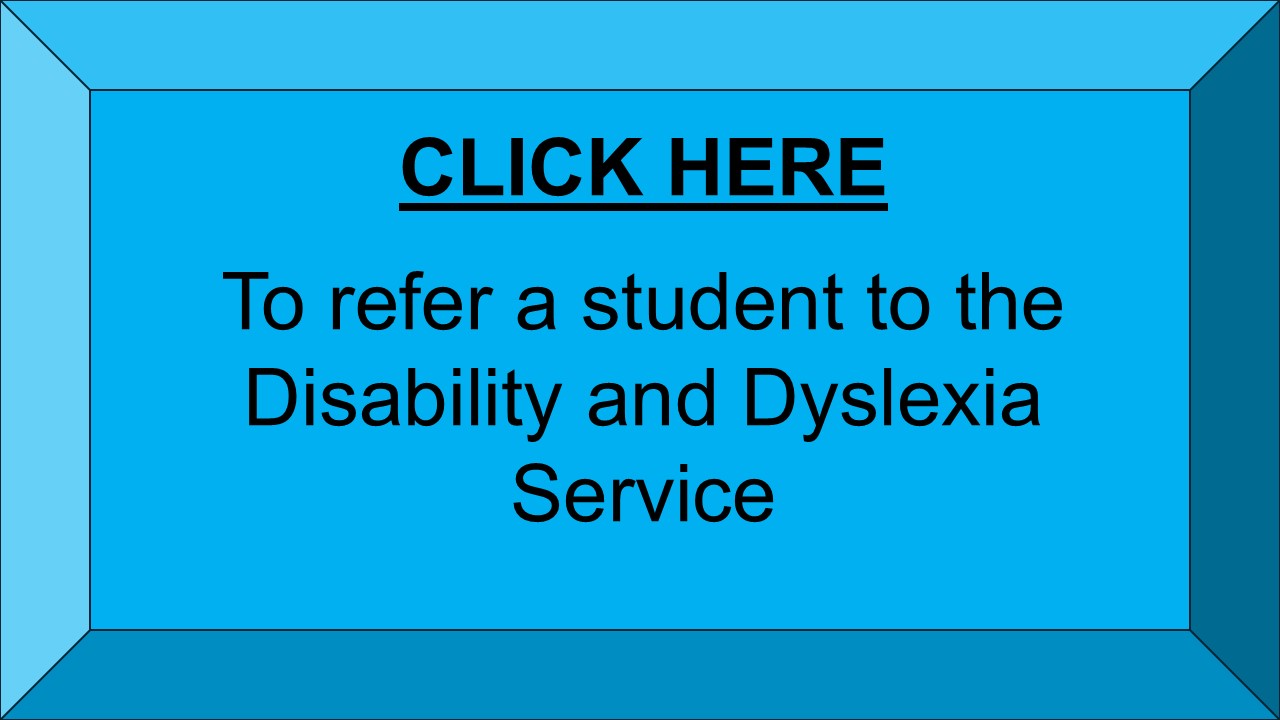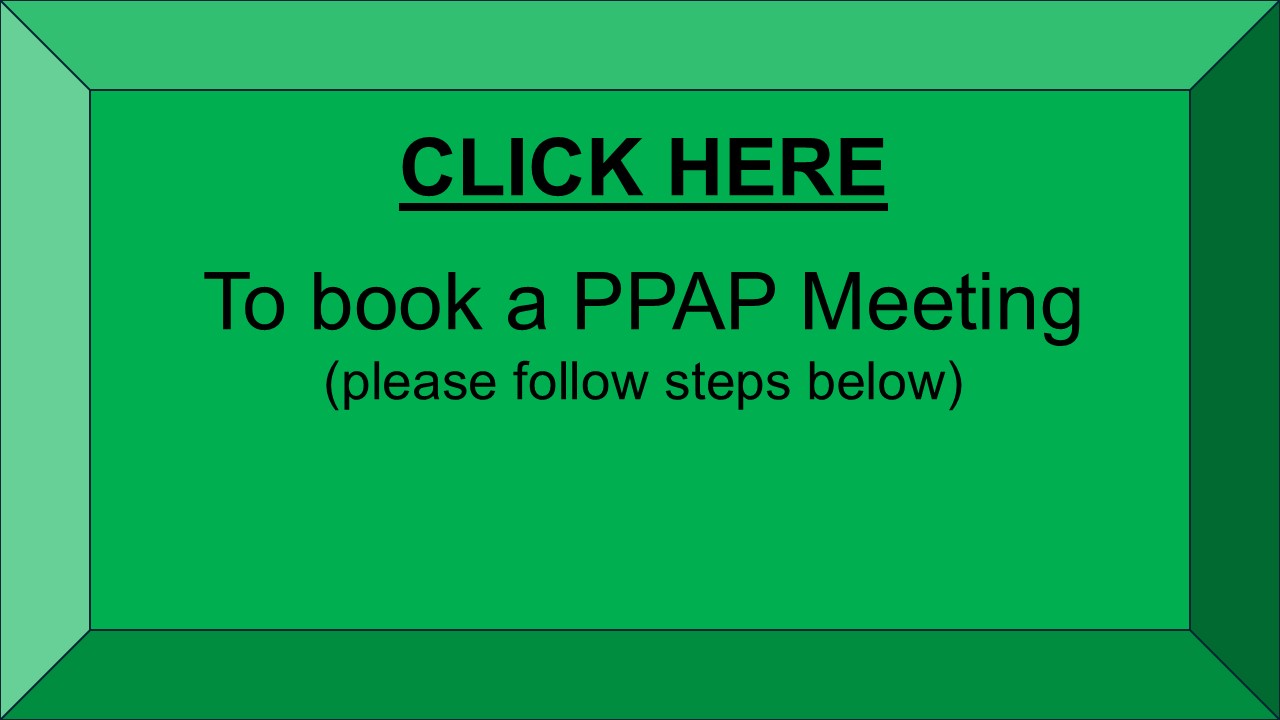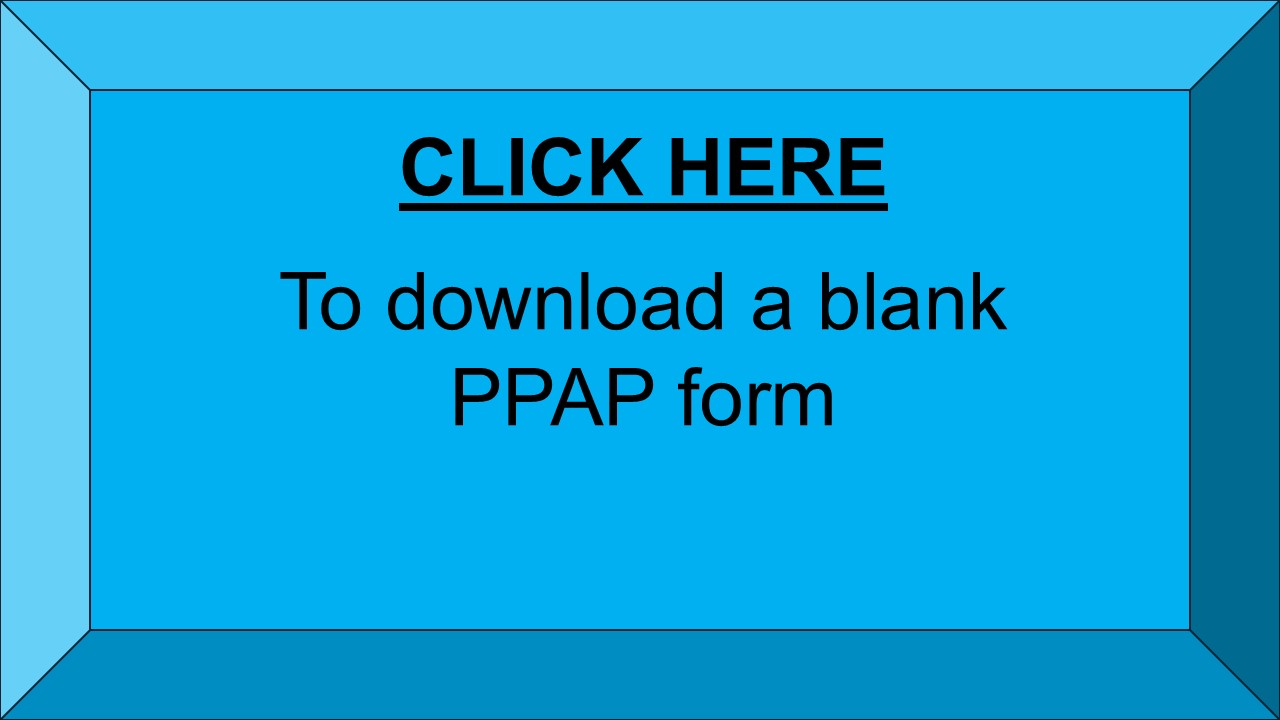Resources for Academic Staff
A centralised list of resources for lecturers and other staff who are supporting students with a disability, specific learning difference or long-term health condition.
Referring a student for support.
If you are concerned that a student with a disability or specific learning difference is in need of additional support, or that the support they currently have isn't sufficient, you can now make a referral and DDS will contact the student.
This form shouldn't be used to refer students experiencing a crisis as it will take us up to 5 working days to action the referral. Please contact FirstPoint or the Counselling and Mental Health Service for students who need immediate support
Reasonable Adjustments Plan (RAP – formally DDS1) location on Sole
A guide, using SOLE screenshots, to finding and viewing the Disability and Dyslexia Service’s reasonable adjustment recommendations for students with adjustment and support needs. This covers information on how to view student RAPs for module tutors, PATs and Research Supervisors.
Module tutor -SOLE Guide to Finding Support Plans
PAT Guide - How to Find DDS Student Support Adjustments on SOLE
Research Supervisor - How to Find DDS Student Support Adjustments
SCALE
Student Centred Adult Learning Engagement in Higher Education
A resource to help tutors develop skills in identifying and developing inclusive approaches to student support. Through an online learning environment toolkit. SCALE promotes and shares good practices aimed at improving student engagement and retention.
Busy Lecturers Guide
A resource developed by a University of Worcester tutor aimed at giving real life tips to inclusive practice through general advice, links to resources and 9 scenarios.
Research Supervisors
A University of Worcester Research School guide for Research Supervisors on reasonable adjustments considerations to support research students. The guide covers the various stages students' progress through on their MPhil/PhD.
Placements
A University of Worcester Academic Quality Unit guide for staff in managing placements and work-based learning for disabled students.
Inclusive Assessment and Reasonable Adjustments Policy
University Academic Quality Unit policy and procedures on inclusive practice, reasonable adjustments and alternative assessment arrangements. This includes the legal context, inclusion by design and examples of reasonable adjustments in tests and assessments.
https://www2.worc.ac.uk/aqu/documents/InclusiveAssessmentPolicy.pdf
Making Assessed Presentations More Inclusive
Assessed presentations are an ideal alternative to assessing written pieces of work as they will allow the student to demonstrate their knowledge using different skill sets, though some students will still experience barriers to being able to do this. These checklists provide some ideas about how assessments can be varied to make them inclusive for different groups of students, and how students can be guided to make their presentations inclusive.
Checklist of alternative ideas for presentations.pdf
Checklist for giving inclusive presentations.pdf
Inclusion Toolkit
University guide to inclusively planning and designing learning activities to support learning, assessment and feedback.
https://www2.worc.ac.uk/inclusiontoolkit/
Inclusive Practice Suggestions
A useful summary document of easy things to do to make lectures inclusive.
Inclusive Practice Suggestions.
Creating Accessible Documents
University and Microsoft quick guides to making teaching content inclusive and accessible. Includes the Busy Lecturers Guide to Accessibility.
https://it.wp.worc.ac.uk/accessibility/
Creating Accessible PowerPoint Presentations
Video on how to create PowerPoint slides with the correct content reading order for students using screen reader software.
MS Office Accessibility-Checker Video
Video guide on using the accessibility checker in Microsoft and the ‘fix issues’ suggestions to improve content.
Blackboard Ally Guide
Guide to checking the accessibility of digital content and how to fix issues. Ally also creates alternative formats of uploaded content for students to download in their preferred format.
https://lttu.uk/support/Blackboard/Manual/ally.html
Live Subtitles on Lecture PowerPoint Presentations
Screenshots on how to enable live subtitles for PowerPoint presentations as an additional option for students to access the content live.
IT Services Guides to Generative Artificial Intelligence
Sharepoint Site from IT Services advising on how generative AI can be used to support teaching and learning
https://uniworcac.sharepoint.com/sites/generative-ai
Students can experience a wide range of different conditions which will create barriers during their education. This section aims to provide some basic information about the commonest conditions that students receive support for.
Useful Document - Common Challenges to the Achievement of Learning
Autism/Autistic Spectrum Conditions (ASC)
As a University we use the term Autism or Autistic Spectrum Condition (ASC), but some student have use the terms Neurodiverse, Asperger's Syndrome, or Autistic Spectrum Disorder (ASD) when describing their diagnosis.
What is autism? https://www.autism.org.uk/advice-and-guidance/what-is-autism
What are meltdowns and shutdowns? https://www.autism.org.uk/advice-and-guidance/topics/behaviour/meltdowns/all-audiences
Dyslexia
Between 7-8% of the University's student population will have a print disability, such as dyslexia.
Sometimes, simple adjustments to a document can make it much easier for someone with dyslexia to access.
British Dyslexia Association Style Guide.pdf
The Ethical and Effective Use of AI
A guide to the ethical and effective use of AI when writing assignments and undertaking research, written by the Library Services Team.
A student's guide to using generative artificial intelligence (Downloadable PDF)
General Information from Firstpoint
A-Z listing of all the support and important information web pages that a student will need.
Signposting to General Student Support
University of Worcester guide for staff on student support and signposting suggestions for a wide range of What If.... scenarios e.g. if a student is homeless, experiencing distress, has a careers enquiry.
https://www.worcester.ac.uk/documents/signposting-student-support-guide-for-university-staff.pdf
Booking an appointment with a Disability Adviser
Online self-booking service to make an appointment with one of the University's Disability Advisers.
Funding for support for disabled and dyslexic students
Information on how eligible students can apply for Disabled Students Allowance (DSA). The support typically includes specialist notetaking software, read aloud and/or dictation software. It can also include 1:1 Specialist Mentors and/or Specialist Study Kills tutors. Disability Advisers usually guide students through this process.
https://www2.worc.ac.uk/disabilityanddyslexia/funding_for_support.html
Wellbeing Support
15 links to a variety of support services both at the University of Worcester (Fancy a Cuppa, Counselling and Mental Health, University Security) and externally (NHS 111, Samaritans, Papyrus Hopeline UK) .
Wellbeing Support - Service Site - University of Worcester
Hive: Accessibility Support
List of accessibility resources available at The Hive.
https://library.worc.ac.uk/accessibility-support
AccessAble
A guide to each University building on each campus highlighting access features by description and photos e.g. nearest car park, colour contrasts, hearing loop facilities, lighting levels and physical access. There are also step by step route guides to accessible travel between campuses and to/from Foregate Street railway station. The routes include information on flooring, crossings, gradients etc.
https://www.accessable.co.uk/university-of-worcester
Practice Placement Adjustment Plans (PPAP) - How to Book.
|
Please note: A student needs to have a Reasonable Adjustment Plan (RAP) before they can have a PPAP. If your student doesn't have a RAP, please use the Online Staff Referral Form (CLICK HERE) and we will contact them to discuss initial support. PPAP meetings can be booked while a RAP is being discussed with the student, but please book the PPAP meeting at least 3 weeks in the future, to give enough time for a RAP to be produced. |
New easier booking process!
- Select the appointment you wish to book.
- Complete the form using the student's details as the 'customer'.
- Please include the student number so we can locate the correct student file.
- Include your email address in the 'Guest email' section.
- Click 'submit'.
Everyone will receive a booking confirmation, and then reminders at 72, 24 and 1 hour before the appointment.
The booking will not automatically appear in your Outlook calendar and will need manually adding.
To cancel a booked PPAP meeting, please email disability@worc.ac.uk
PPAPs and Occupational Health Assessments
PAPPs are not meant to replace occupational health assessments (OHA). The PPAP aims to empower the student to discuss their support needs on placement with their placement provider, and recommendations from an OHA may be included as part of the PPAP.
A summary of how the two processes interact can be downloaded HERE
Get in touch
Email: disability@worc.ac.uk
Phone: 01905 855531
Book an appointment with a disability adviser.
We offer online appointments using Microsoft Teams or in person at firstpoint, Peirson Centre, St Johns Campus.
Appointments last a maximum of 45 minutes.



